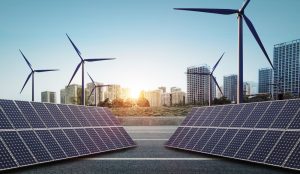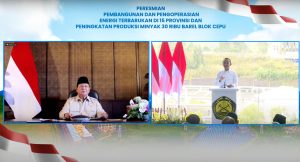PRESS RELEASE*

Jakarta, 29 April 2025 – ZONAEBT successfully organised “Forum Surya”, a cross-sector online discussion held on Tuesday (29/4). With the theme, “Realising Indonesia’s Sustainable National Energy Security”, the event brought together solar energy experts, practitioners, and government representatives to discuss strategies to accelerate the transition to clean energy in Indonesia, especially in solar panels.
Through this forum, ZONAEBT presents a strategic platform to discuss challenges, opportunities, and strategies for solar energy development in Indonesia. The forum is also a discussion forum for stakeholders related to energy policy, sustainable investment models, and technological innovation in the solar panel industry. By bringing perspectives from various parties, the forum is expected to produce concrete solutions to accelerate the national energy transition.
Solar Energy, the Main Pillar Towards Net-Zero Emission
The forum also explored various business models, financing schemes, and regulations that can encourage the growth of the solar panel industry in Indonesia. One crucial aspect in the development of solar energy is the availability of adequate infrastructure and sustainable investment. Without policies that provide investment incentives and ease of licensing, this industry will be difficult to develop optimally. In addition, education and increasing public awareness of the benefits of solar energy are also important factors in accelerating the adoption of this technology in various sectors.
Active participation from the community and household sector in adopting solar panels is important in driving a more inclusive energy transformation. Recognising this, the forum also discussed best practices from various countries and successful case studies in Indonesia that can be used as references. The goal is to encourage the implementation of solar energy in various sectors, ranging from housing and industry to small and medium enterprises (SMEs).
Government emphasises importance of cross-sector collaboration

To enrich the discussion, the forum was divided into two discussion sessions, each of which presented speakers from various backgrounds to convey their strategic views regarding the development of solar energy in Indonesia.
The discussion was opened with a Keynote Speech delivered by Bhakti Nuryadin, S.T., M.T., a representative from the Directorate General of New Renewable Energy and Energy Conservation of the Ministry of Energy and Mineral Resources.
Bhakti conveyed Indonesia’s commitment to achieving zero per cent emissions by 2060 as a mitigation measure against climate change. One of the main strategies to achieve this target is developing renewable energy, especially solar energy. He mentioned that solar energy has the most significant renewable potential in Indonesia, reaching 3,294 GW, with a current realisation of 675 MW. Despite the huge potential, Bhakti emphasised that collaboration between all parties, including the government, private sector, and the community, is needed to realise an effective energy transition.
“For this transition, we also need collaboration, because without collaboration from all stakeholders, what we aspire to will only be an ideal,” Bhakti said in his opening remarks.
The Future of Solar Energy Policy

The first session of the discussion was opened by Michael Suryaprawira, a researcher from the Purnomo Yusgiantoro Centre (PYC) as the moderator of the first session. With the theme “The Future of Solar Energy Policy in Accelerating the Development of PLTS in Indonesia”, the discussion featured various experts, including Alvin Putra Sisdwinugraha (Electricity and Renewable Energy System Analyst), Haidar Ahmad Daffa (Indonesian Solar Energy Association), and M. Firmansyah (PERPLATSI – Association of All Indonesian Rooftop PLTS Installers). The speakers shared their views on the challenges and opportunities related to solar energy regulation in Indonesia, as well as the role of policy in supporting the development of solar panel systems (PLTS) in the country.
In this first session, the speakers explained that solar energy is considered the key to the energy transition.
Alvin explained that solar energy has two main advantages: versatility and affordability. Haidar added that advances in solar panel technology allow for increased access and ease of implementation of the solar energy mix in various regions. Meanwhile, M. Firmansyah highlighted the importance of solar energy regulatory stability in Indonesia, which he said greatly affects the sector’s investment climate.
In response, Alvin asserted that electricity in Indonesia is currently still very much centred on PLN as the main executor. However, as a state-owned company, PLN also must serve the public interest (public service obligation). He stated that achieving the energy transition target should involve the role of the private sector, one of which is through strengthening the PLTS-based electricity network.
“Electricity in Indonesia is still very PLN-centric, it (PLN) is the main executor in the electricity sector. However, as a state-owned enterprise, PLN must perform public version obligation. Achieving the target should utilise posts filled by the private sector. This can be done by strengthening the grid and the PLTS electricity network. With the public private partnership model, PLN with its limited financial capacity can involve the private sector,” said Alvin, affirming M. Firmansyah’s answer.
All three speakers agreed on the importance of continued dialogue involving more stakeholders from various sectors, especially regarding regulations. Haidar pointed out that Indonesia can learn from implementing solar panels in neighbouring countries. He also emphasised the importance of educating the general public to build a strong public understanding of solar energy development in the country.
Solar Energy Business Opportunities and Challenges

After the first session, the forum continued to the second session discussion with the theme “Opportunities and Challenges of Solar Energy Business in 2025.” This session presented practitioners from the solar energy industry, namely Ridwan Kurnia (Director of Engineering and Operations – PT Surya Energi Indotama/SEI), Anggita Pradipta (Group Head of Marketing – SUN Energy), and Zidny Ilman (Head of Public Policy and Government Relations/PPGR – Suryanesia). Andhita Mustikaningtyas, Co-Founder and Board of Commissioner of BTI Energy, moderated the second session.
To spark the discussion, Andhita asked a question about the development of the solar energy business in the last five years and its future opportunities. Anggita responded by highlighting the increase in demand, especially from the small and medium industry sector. Overall, he assessed that the solar panel industry is experiencing significant growth, both in terms of demand and in terms of strengthening the ecosystem. Ridwan also affirmed the optimism by mentioning that the number of business players in this sector continues to increase. However, he reminded the importance of maintaining balance by paying attention to five main aspects: technology quality, human resources, regulation, financing, and market education.
“Partnership is absolute, (because) it turns out that we cannot progress with a single entity. We have to collaborate, so this ecosystem is important to encourage each other to be stronger,” Ridwan explained.
Satrio Yudho, a lecturer at PLN Institute of Technology, also shared various innovations and research results on solar panel development that are being developed at ITPLN. With a showcase approach, to take a closer look at how these innovations are applied theoretically and practically in supporting the advancement of solar energy technology in Indonesia.
——-
As a pioneer of renewable energy education and information platforms in Indonesia, ZONAEBT continues to be committed to strengthening the role of the community, private sector, and government in realising a just and inclusive energy transition. This Solar Forum is one of ZONAEBT’s concrete steps in encouraging cross-sector strategic dialogue, building a collaborative ecosystem, and accelerating the use of solar energy as a pillar of national energy security.
“We believe that energy transition is not just a technology issue, but a matter of collaboration, equality, and a shared future,” said I Kadek Alamsta Suarjuniarta, CEO & Founder of ZONAEBT.
About ZONAEBT
ZONAEBT is a startup renewable energy information and education platform in Indonesia, which has been established since April 2021 and actively supports an equitable energy transition and leaves no one behind. With a vision to empower individuals and organisations to transition to equitable and sustainable energy, and a mission we know our success – past, present and future is built on us growing & thriving by your side. This ecosystem provides our legacy and our future.
Media contact
https://zonaebt.com/
hello@zonaebt.com
085175878765
*This post is part of a media collaboration between tanahair.net and ZonaEBT.com














